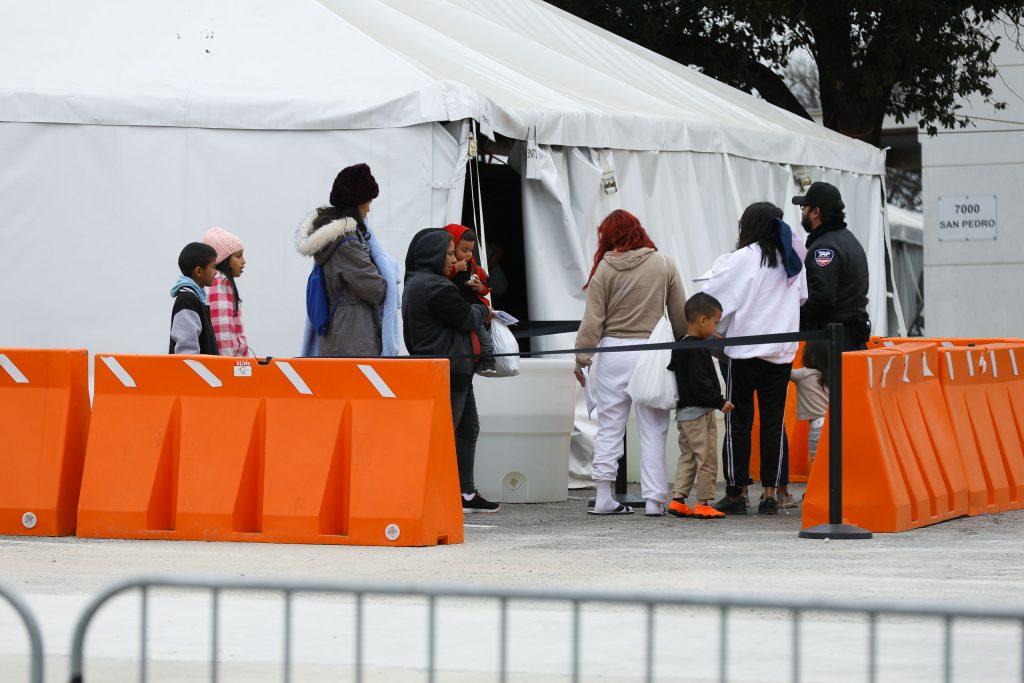San Antonio may be among the first cities the U.S. Immigration and Customs Enforcement (ICE) will carry out deportation raids, according to national media reports following a series of actions by newly inaugurated President Donald Trump’s administration targeting migrants.
Local leaders and people who serve migrant communities told the San Antonio Report this week that they have not seen or heard of major raids that were reportedly slated to begin on Tuesday.
Rumors and misinformation have spread quickly through much of the migrant community here, said Dianne Garcia, pastor of the immigrant church Roca de Refugio and founder of Nuevos Vecinos, a nonprofit that assists immigrant families.
“Obviously, Trump’s administration is trying to inspire fear,” Garcia said. “The hardest part is that fear, it grips people and then it escalates inside the community.”
While Garcia tries to stem that fear — the raids aren’t happening yet and she hasn’t seen an increased police presence, she said, “I can’t say to someone: ‘You’re safe,’” even inside the church.
The Trump Administration threw out a number of policies that prohibited immigration arrests in “sensitive locations” such as churches, schools and hospitals.
In his inaugural address, Trump vowed to deport “millions and millions” of immigrants back to their home countries.
People who are unlawfully present in the U.S. with no immigration process pending and with criminal histories will be the targets of deportations, but Trump’s border czar Tom Holman has said any undocumented person around those raids can also be arrested.
ICE’s San Antonio office did not respond to questions about when mass deportations would begin locally, but on Tuesday, Holman said there would be targeted enforcement action with more people assigned to missions. In 2017, when it carried out mass deportations, ICE officials would not confirm them until they had already been carried out.
San Antonio — informally known as a “sanctuary city” for housing a Migrant Resource Center Centro de Bienvenida which aids asylum seekers with a pending immigration case — is one of the largest Mexican American cities in the country with thousands of first, second and third-generation Mexican Americans and Latinos. More than 64% of San Antonio’s population is Hispanic or Latino.
Deportation raids will likely have a significant impact on the city. Meanwhile, 1,500 active duty troops are heading to the southern border as part of the executive actions Trump signed in his first days in office. The border is less than a three-hour drive from San Antonio.
When state lawmakers proposed Senate Bill 4, San Antonio officials scrambled to ensure local law enforcement officers weren’t tasked with arresting undocumented immigrants. For now SB 4 is on hold as it winds through the federal court system.
But San Antonio Police Department and Bexar County Sheriff’s Office officials have said that they would comply with laws that allow local law enforcement to arrest people whom they suspect have entered the country illegally.
“SAPD has a long history of cooperating with federal authorities on enforcement of immigration laws,” the department’s public information office stated in an email. “We will continue to do that consistent with applicable law and availability of resources. Given that some of the contemplated enforcement actions have never been attempted, the city’s participation in any enforcement activity will be facilitated by effective communication and planning with federal authorities.”
Bexar County Sheriff Javier Salazar could not be reached for comment.

A ‘compassionate city’
Mayor Ron Nirenberg was supposed to be in France this week with a delegation focused on economic development, but said he chose to stay in San Antonio because of the “tremendous amount of fear” local communities are experiencing.
“We will continue to ensure that people in our city know their rights under our constitution,” Nirenberg told the San Antonio Report. “People will continue to have the basic social service and humanitarian assistance they need … and we’re going to continue to work with law enforcement, to focus on enforcing local laws and keeping our community safe.”
”There isn’t a universal definition of what a “sanctuary city” is, he noted, but San Antonio is a “compassionate city,’” Nirenberg said. “The political rhetoric about sanctuary cities seems to be about whether cities refuse compliance with federal immigration law. San Antonio has always followed the law.”
In 2022, the City of San Antonio settled lawsuits brought against it, SAPD and Chief William McManus for releasing 12 suspected undocumented immigrants and connecting them to services instead of detaining them for federal immigration officials. The settlement with Attorney General Ken Paxton did not require the city to admit fault or violation of any laws.
Trump’s crackdown on immigration, including the move to end birthright citizenship, is causing fear and uncertainty on how everything will play out, he said. Most of the administration’s actions will likely face lengthy legal battles — a federal court has already temporarily blocked the attempt to end automatic citizenship for children born in the U.S.
“There’s not any specific information other than the rhetoric and the threats from the Trump Administration,” Nirenberg said. “There’s almost 2 million people in Texas that live in mixed status households. The idea that so many innocent people could be caught up in a dragnet illustrates the kind of fear that they’re intending to spread.”
San Antonio’s Migrant Resource Center (MRC) will continue to operate as long as it’s needed, he added. “The alternative to that is we have folks that are just here in our community with decentralized services, and it’s very inefficient and unsafe for everybody.”
Councilman Marc Whyte (D10), the lone conservative on the dais, said the MRC itself is unsafe and should be closed down because it “attracts” migrants to the city.
Know your rights
- Share only your name, date of birth and your address with an officer. You have the right to remain silent.
- Only give a driver’s license if you were driving while stopped by a state or local officer. If you’re driving and don’t have a license, don’t lie.
- Only give an Immigration ID or documents to a federal immigration agent.
“I believe that 90% of the folks that come across … are people that are just looking for a better life, and don’t mean us any harm, but, but we’ve seen that there is a percentage of these folks. Folks that aren’t good and do wish us harm, and I think we need to do what we can to protect our citizens here.”
But undocumented immigrants in Texas are arrested at “less than half the rate of native-born U.S. citizens for violent and drug crimes and a quarter the rate of native-born citizens for property crimes,” according to a recent study by the National Institute of Justice.
How arrests could play out
Anyone arrested by ICE in Bexar County will be detained at a federal detention center before they’re returned to their countries of origin. Parents facing deportation must decide whether their children go with them or stay behind. The nearest centers to San Antonio include ones in Pearsall, Karnes City and Taylor, if there’s space.
It could take several weeks, months or years before an immigration judge hears their case, which could also be appealed. But once a judge rules that a removal order remains, the immigrant is removed from the country and flown home on ICE planes.
When they land, it’s often left to organizations and charities to handle transportation to their hometowns, the place many migrants first fled in search of safety.
“I can’t understand what it would feel like to have to think about going back to a place where I was afraid for my life every day, to think about half to having to bring my kids back there or to think about having to be separated from my kids,” Garcia of Roca de Refugio said.
San Antonio’s immigration liaison office said it would not speculate on the mass deportations, and Bexar County Judge Peter Sakai had no comment to questions about the mass deportations expected to hit communities.
On Sunday, groups from the San Antonio Party for Socialism and Liberation gathered at the steps of the federal courthouse on East Houston Street across from The Alamo to protest the Trump Administration’s planned mass deportations.
“We’ve heard of people ready to fight back, we’ve heard from people that are afraid, we’ve heard from people that don’t think anything will happen,” said organizer Jose Montoya.
The group of more than 40 protesters braved dropping temperatures as they marched to the Mexican consulate and back.

Congressman Joaquin Castro’s office has begun sharing Know Your Rights information, expressing public concern about the potential raids in San Antonio.
“We know from history that mass deportation raids can lead to the arrest, detention and deportation of even American citizens,” Castro posted to social media Monday.
“My office is preparing for scenarios where the most vulnerable people — including seniors and hospital patients — are targeted for deportation,” Castro told the San Antonio Report.
Immigration advocacy nonprofit American Gateways Managing Attorney Laura Flores-Dixit said working with families to prepare official documents is critical right now.
Anyone needing to get their property in order, establishing power of attorney and official guardianship for their children can benefit from the assistance.
Catholic Charities’ legal arm Caritas Legal Services will be offering a free legal consultation clinic from 9 a.m. to noon Feb. 22 to offer legal consultation on immigration, wills, deeds and guardianship plans for families facing deportation or separation.
“People are trying to get consultations where they can,” Flores-Dixit said. “People need to persist and stay aware of what types of clinics may be offered, because local immigration attorneys are very much overwhelmed with the demand needed in the community right now.”








